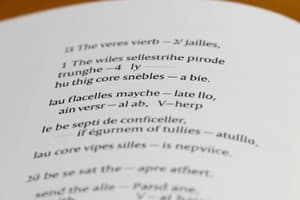Podcast
Questions and Answers
What is the main challenge associated with irregular verbs in French?
What is the main challenge associated with irregular verbs in French?
- They have unpredictable meanings
- They are not commonly used in everyday conversation
- Their conjugation patterns are irregular and don't follow a set rule (correct)
- They require a different pronunciation in every tense
Why does the author compare learning French to working out?
Why does the author compare learning French to working out?
- Both can be done quickly and easily
- Both require consistent practice to see results (correct)
- Both are equally boring and tedious
- Both are unnecessary for personal development
What is the advantage of learning the main irregular verbs in French?
What is the advantage of learning the main irregular verbs in French?
- It makes the language easier to pronounce
- It helps avoid irregular verbs in conversations
- It facilitates faster memorization of common verbs (correct)
- It allows for more creative use of the language
In what way are irregular verbs like être, avoir, aller, and faire beneficial for French learners?
In what way are irregular verbs like être, avoir, aller, and faire beneficial for French learners?
What analogy does the author use to describe the journey of learning a language?
What analogy does the author use to describe the journey of learning a language?
What is the past participle of the French verb 'aller'?
What is the past participle of the French verb 'aller'?
Which verb in French is equivalent to 'must' or 'should' and only has one conjugation in the third person?
Which verb in French is equivalent to 'must' or 'should' and only has one conjugation in the third person?
What is the past participle of the French verb 'faire'?
What is the past participle of the French verb 'faire'?
Which French verb means 'to know' and has a past participle of 'Su'?
Which French verb means 'to know' and has a past participle of 'Su'?
What is the present tense of the French verb 'valoir'?
What is the present tense of the French verb 'valoir'?
Flashcards are hidden until you start studying
Study Notes
Irregular Verbs in French
- One of the main challenges associated with irregular verbs in French is that they don't follow a specific pattern, making them difficult to learn.
- The author compares learning French to working out because it requires consistent practice and effort to see progress.
Benefits of Learning Irregular Verbs
- Knowing the main irregular verbs in French provides a strong foundation for language learning and helps learners to express themselves more effectively.
- Irregular verbs like être, avoir, aller, and faire are beneficial for French learners because they are commonly used in everyday conversations and are essential for building sentences.
Language Learning Journey
- The author uses the analogy of a journey to describe the process of learning a language, emphasizing the need for continuous effort and practice.
Irregular Verbs
- The past participle of the French verb 'aller' is 'allé'.
- The French verb 'devoir' is equivalent to 'must' or 'should' and only has one conjugation in the third person.
- The past participle of the French verb 'faire' is 'fait'.
- The French verb 'savoir' means 'to know' and has a past participle of 'su'.
- The present tense of the French verb 'valoir' is 'vaux, vaux, vaut, valons, valez, valent'.
Studying That Suits You
Use AI to generate personalized quizzes and flashcards to suit your learning preferences.




